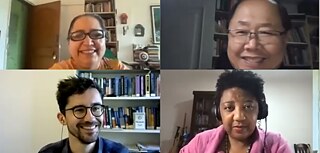Associations, effects, outlooks - what do the Indian author Paromita Vohra, the South Korean professor of philosophy Kwang Sun Joo, the Brazilian artist Rosana Paulino and the German professor of sociology Jan Paul Heisig associate with COVID-19 and the worldwide pandemic in their countries and in a global context?
The Goethe-Institut has invited the four experts to three online discussion to speak about the situation in their respective countries. Which similarities and which differences can be identified? On 21 July 2021, Paromita Vohra, Kwang Sun Joo, Rosana Paulino and Jan Paul Heisig met for the first time. The exchange focused on the question of the significance of proximity and distance phenomena. What do they associate with the theme proximity and distance in relation to the corona pandemic?
Online discussion on 21 July 2021: Experts in Conversation - Reflections on the Pandemic - YouTube
Online discussion on 21 July 2021: Experts in Conversation - Reflections on the Pandemic - YouTube
The experts identified a number of differences, but also many similarities, in dealing with the effects of the pandemic in Brazil, South Korea, Germany and India. In all four countries, particularly the cooperation and the local community have developed positively. On the other hand, they observed significant dangers to people's mental health as a result of lockdowns and other regulations.
Community and Solidarity
Paromita Vohra, Kwang Sun Joo, Rosana Paulino and Jan Paul Heisig met for the second time on 25 August 2021. This time the discussion focused on solidarity - both on national and on global scale. The neighbourhood support structures in Germany or South Korea may be different from those in Brazil or India, but in all countries people became more sensitive to the needs of others. Is it however only a matter of transient closeness or will the world be a different place after the pandemic? Will this experience strengthen the collective consciousness? Is the distance between social classes becoming even wider? And what does the global vaccination policies reveal about the divide between the global North and the global South?
Onlinediskussion am 25. August 2021 in englischer Sprache: Expert*innen im Gespräch - Gedanken zur Pandemie - YouTube | Goethe-Institut
Onlinediskussion am 25. August 2021 in englischer Sprache: Expert*innen im Gespräch - Gedanken zur Pandemie - YouTube | Goethe-Institut
The pandemic poses undoubtedly one of the greatest challenges to humanity. The discussion among the experts focused on “global solidarity”, as the South Korean professor of philosophy Kwang Sun Joo summarises it. “The conscious of a global community transcends boundaries.”
Was comes next?
Paromita Vohra, Kwang Sun Joo, Rosana Paulino and Jan Paul Heisig met for the third and last time on 27 September 2021. Topic of the discussion this time: What does the future hold? What lessons we have learned, and what awaits us in a post-pandemic era? Will social distancing continue to define our lives in the future, or will we live as if the pandemic never happened?
Online discussion on 27 September 2021: Experts in Conversation - Reflections on the Pandemic - YouTube
Online discussion on 27 September 2021: Experts in Conversation - Reflections on the Pandemic - YouTube
The post-pandemic time is hardly to foresee - the virus and its unpredictability continue to hold a strong grip on us. It is just as difficult for the experts to make an assessment: The German sociologist Jan Paul Heisig does not see many long-term “changes in social behaviour” and the Brazilian artist Rosana Paulino even draws the conclusion that “mankind has learned nothing from the past.”
